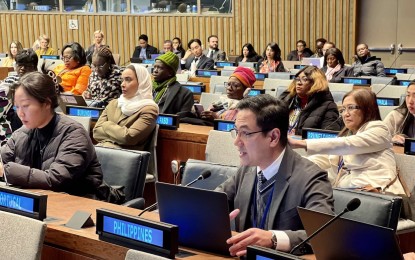
GENDER SENSITIVE. Department of Science and Technology (DOST) Advanced Science and Technology Institute Director Franz de Leon (front) delivers the Philippine statement during an interactive dialogue at the 68th Session of the Commission on the Status of Women (CSW) on March 21. The government is working towards gender mainstreaming its policies on artificial intelligence. (Photo courtesy of PCO)
MANILA— The Philippines is working towards gender mainstreaming its policies on artificial intelligence (AI), the Department of Science and Technology (DOST) said Friday during a high-level UN dialogue on women’s rights.
Delivering the Philippine statement at an interactive dialogue during the 68th Session of the Commission on the Status of Women (CSW) on March 21 (New York time), DOST Advanced Science and Technology Institute Director Franz de Leon said the government is committed to addressing the gender divide and ensure that girls and women have equal access to emerging technologies.
The Philippines launched its National Artificial Intelligence Roadmap in 2021 but de Leon admitted that the first version “did not reflect gender considerations”.
The roadmap aims to accelerate the adoption and utilization of AI in the country to advance industrial development.
“Although the first version did not reflect gender considerations, we are working towards gender mainstreaming in our AI policies by forming an AI advisory board to refine this roadmap. Two members of this board are women to ensure balanced perspectives on our priorities,” de Leon said.
Currently, the Philippines is implementing projects to train women in AI, data science, analytics, and related fields through online learning.
The country, De Leon said, also supports AI research and development projects through grants with gender sensitivity and inclusivity as part of the criteria for approval.
To safeguard women and girls from harm caused by AI, the Philippines has also enacted several gender-related laws.
These include the Magna Carta of Women, Anti-Violence against Women and Children Act, Safe Spaces Act, Anti-Online Sexual Abuse or Exploitation of Children, and Anti-Child Sexual Abuse or Exploitation Materials Act, among others.
While there are significant challenges to overcome, De Leon noted that AI presents numerous opportunities for advancing gender equality when developed "thoughtfully, ethically, and inclusively".
“It requires collaboration among diverse stakeholders, including policymakers, technologists, researchers, and civil society organizations, to harness the full potential of AI for promoting gender equality," he said.
"The Philippines remains committed to leveraging technology to promote gender equality, while also safeguarding women's and children’s rights,” he added. (PNA)
